Signs of Illness in Pet Birds
Birds are masters when it comes to hiding signs of diseases or illness.
They will do whatever it takes to fool you! As with all parrot behaviors, this one is instinctual. In the wild, sick birds are an easy meal.
Predators target the sick and ill birds first. If your little guy isn’t feeling well, he’ll pretend he is just fine and dandy to avoid becoming someone’s next meal.
By the time most people notice their bird is sick, sometimes it can be too late. At this point, the bird is so sick he just can’t keep up his little charade any longer.
My very first bird, a pudgy Lutino Cockatiel named Charlie, seemed fine until one day when I took her out of her cage and she was lethargic and refused to eat.
I rushed her to the vet, who did test after test, then sent me home with her, instructing me to keep her warm. Unfortunately, it was too late and she died that evening. I was devasted.
When the test results came back, it turned out she had kidney failure. I had no idea because she had acted normally up until that morning. And, shame on me, I had not been getting her regular veterinary care.
Sorry, this isn’t meant to bum anyone out. The point is that you need to pay strict attention to your bird to see if she might be sick, or else she could easily fool you.
10 signs of illness in birds to watch for:
Weight loss.
One of the first signs of illness is frequent or gradual weight loss.
You should have a gram scale in your home that you can use to weigh your bird.
These can be found at bird specialty shops.
Weigh your bird at the same time, before feeding her, at least once a week.
A 10% weight loss is considered significant.
Unusual Droppings.
A bird’s droppings tell a story about her health and her diet. Check droppings every day.
Use plain white paper or wax paper to line the cage so you can see droppings better.
Watch out for changes in color, consistency, volume of droppings. Emphasize More on droppings texture and frequency later.
Loss of appetite.
If you notice your bird has stopped eating, it’s a serious sign of illness.
Abnormal Breathing.
- Labored breathing,
- continuous clicking,
- gasping,
- Respiratory distress symptoms are serious and require vet intervention at the earliest.
Fluffed feathers.
If your bird is still perching with its feathers fluffed, you should immediately put it to a source of heat and call the avian vet.
Nasal discharge/wet sneezing.
Your bird should not have any discharge from her nares (the nostrils above the beak).
All birds sneeze, but continued wet sneezes are cause for concern.
Lethargy.
All birds take naps during the day, but if your bird seems to be sleeping more than usual, you should be concerned.
Tail bobbing.
Birds who are having trouble breathing often have tail bobbing. This is when the tail bobs up and down as the bird breathes.
Abnormal Plumage.
Abnormal feather growth, loss of feathers that is not due to normal molting, or sticky/matted feathers are all cause for concern.
This could indicate a vitamin or mineral deficiency caused by diet, lack of natural sunlight, or a more serious problem affecting the vital organs, or from Beak and Feather Syndrome.
Change in voice.
If your normally noisy bird suddenly stops singing or screaming, you should be worried.
Or if a normally quiet bird starts to make a bit of noise, pay attention. She’s trying to tell you something.
There are other things that you will be able to notice right away if there is a problem with your bird.
These would be considered emergencies and warrant a call and a visit to an avian veterinarian as soon as possible:
- Discharge from eyes, mouth, vent, or nares
- Broken limbs
- Bleeding
- Vomiting (which is different from regurgitation. Vomiting results in a sticky residue on the face and head)
- Very labored breathing
- Not able to perch or usually sitting on the cage bottom.
- Seizures or other neurological problems
Obviously, the above is not meant to be an inclusive list and needs updation as per needs.
You know your bird best and need to determine when veterinary care is warranted. Now on to droppings.
Droppings
Monitoring your bird’s droppings is one of the best things to do, but first, you need to know what you’re looking for.
Abnormal Bird Droppings:
- Increased size.
- Changes in color are not related to diet (blueberries would make the droppings blue, for instance).
- Are often wet.
- Carry a smell.
Healthy Bird Droppings:
- Small with a white cap.
- Usually have a down feather linked to it.
- Have no sign of wetness surrounding it.
- Have no nasty smell.
The best way to keep your bird healthy is to follow a healthy parrot diet and to get regular veterinary care.
If you are ever unsure whether or not your bird is ill, it’s always best to seek immediate veterinary care.

Hi, There and Welcome to BirdsNews.com, is here to help you learn and care about pet birds. and this blog is a journal of everything I’ve learned.

